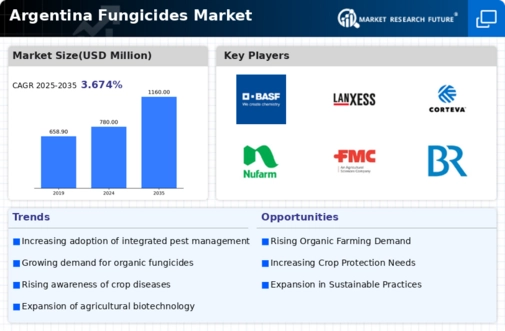Export Opportunities
Argentina's position as a leading agricultural exporter significantly influences the fungicides market. The country is renowned for its soybeans, corn, and wheat, which are vital for international trade. To maintain competitiveness in the global market, Argentine farmers must ensure high-quality produce, necessitating the use of fungicides to protect against diseases. In 2025, the export value of agricultural products is projected to reach $40 billion, highlighting the importance of effective crop protection. As international standards for food safety and quality become more stringent, the demand for reliable fungicides is likely to increase. This trend indicates that the fungicides market will benefit from the growing emphasis on export quality, driving further investment in fungicide solutions.
Climate Change Impacts
Climate change poses significant challenges to agriculture in Argentina, influencing the fungicides market. Variability in weather patterns, including increased rainfall and temperature fluctuations, creates favorable conditions for fungal diseases. As a result, farmers are compelled to adopt fungicides to mitigate these risks and protect their crops. The Argentine government has recognized the need for sustainable agricultural practices, which may lead to increased investment in fungicide research and development. In 2025, it is anticipated that the market will witness a surge in demand for fungicides that are effective under changing climatic conditions. This evolving landscape suggests that the fungicides market will continue to adapt to the challenges posed by climate change, driving innovation and product development.
Rising Agricultural Demand
The increasing demand for agricultural products in Argentina is a primary driver for the fungicides market. As the population grows, the need for food production intensifies, leading to a greater reliance on effective crop protection solutions. In 2025, the agricultural sector in Argentina is projected to contribute approximately 6.5% to the national GDP, underscoring the importance of maintaining crop health. Fungicides play a crucial role in safeguarding yields against fungal diseases, which can devastate crops. The market for fungicides is expected to expand as farmers seek to enhance productivity and ensure food security. This trend indicates a robust growth trajectory for the fungicides market, as agricultural stakeholders increasingly prioritize disease management to meet rising consumer demands.
Technological Integration in Agriculture
The integration of technology in agriculture is reshaping the fungicides market in Argentina. Precision agriculture, which utilizes data analytics and advanced application techniques, enhances the efficiency of fungicide use. Farmers are increasingly adopting these technologies to optimize their crop management practices, leading to reduced waste and improved efficacy of fungicides. In 2025, it is expected that the adoption of precision agriculture will rise, with a projected market growth of 15% in related technologies. This shift not only supports sustainable farming practices but also drives the demand for innovative fungicide formulations that align with technological advancements. Consequently, the fungicides market is likely to experience growth as farmers seek to leverage technology for better crop protection.
Regulatory Support for Sustainable Practices
Regulatory frameworks in Argentina are evolving to support sustainable agricultural practices, which directly impacts the fungicides market. The government is increasingly promoting the use of environmentally friendly fungicides, encouraging farmers to adopt practices that minimize ecological impact. In 2025, it is anticipated that new regulations will be introduced to incentivize the use of biopesticides and other sustainable fungicide options. This regulatory support may lead to a shift in consumer preferences towards products that are perceived as safer for the environment. As a result, the fungicides market is likely to see a rise in demand for sustainable fungicide solutions, reflecting a broader trend towards environmentally responsible agriculture.


















Leave a Comment